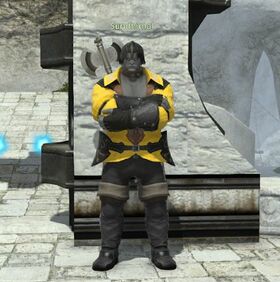Sundhimal
Jump to navigation
Jump to search
Sundhimal
- Gender
- Male ♂
- Race
- Roegadyn (Sea Wolves)
- Zone
- Limsa Lominsa Lower Decks (9,10)
“Greetings, adventurer. Do you wish an explanation of aetherial travel? I am here to answer any queries you might have.
— In-game description
Sundhimal is a Roegadyn in Limsa Lominsa Lower Decks.
Quests Started
| Quest | Type | Level | Quest Giver |
|---|
Quests Involved In
| Quest | Type | Level | Quest Giver |
|---|---|---|---|
| Close to Home | 1 | Baderon | |
| A Burst of Inspiration | 50 | Briardien | |
| Duty Calls | 1 | P'tahjha |
Additional Information
Dialogue
Sundhimal: Greetings, adventurer. Do you wish an explanation of aetherial travel? I am here to answer any queries you might have.
What is aetherial travel? Sundhimal: To understand aetherial travel, you must first understand the nature of aether. Sundhimal: Aether is the source of all life, and the underlying force that makes all forms of arcane manipulation possible. Sundhimal: This ephemeral substance, though unseen and unfelt, flows around and within every single living creature. Sundhimal: In the moment of our death, it is believed that a separation occurs between our spiritual and physical forms. Our bodies break down and are absorbed back into the aetherial river, while our souls continue on to the afterlife. This final journey is sometimes called “returning to the Lifestream.” Sundhimal: However, our ancestors discovered ways in which, through meditation and focus of spiritual energies, one could reduce her body to aether without losing the grip on her spirit, in turn allowing for travel upon the Lifestream. These methods have been given the names Return and Teleport. Sundhimal: As you travel through Eorzea, you will oft come across large floating deposits of a crystalline substance known as aetheryte. The one before us here is a fine example.
What is aetheryte? Sundhimal: It is said that aetheryte is the solid manifestation of the planet's lifeblood, aether, and that by touching it, the aether which makes up our bodies resonates with that contained in the crystal. This is called “attunement.” Sundhimal: Normally, when one's body is reduced to aether, it will naturally gravitate to the location with which it resonates the greatest─or one's “home point.” This is why upon losing consciousness in battle, many wake to find themselves back at an aetheryte. Sundhimal: In other words, aetherytes act as lodestones, assuring that the body, in its aetherial form, is not lost to the pull of the greater flow. Sundhimal: And, because signatures of past attunements are maintained within our bodies, it is possible (with some spiritual training, of course) to ignore the pull back to the strongest resonation, and travel to another beacon. Many refer to this as “Teleportation.” Sundhimal: What is even more amazing is that when teleporting, we can “carry” those with whom we have created a bond, such as an adventuring party─assuming they have previously attuned with the destination aetheryte.
What is the difference between Return and Teleport? Sundhimal: As Return merely involves allowing the body to be drawn back to the strongest aetherial beacon─one's home point─it is fairly easy to execute and requires very little spiritual exertion. Sundhimal: Usually, a few moments of rest is all that is needed before it is safe to attempt another jump. Sundhimal: Teleportation, on the other hand, comes with a greater price. A great deal of spiritual energy known as “anima” is required to fight the natural flow of the Lifestream and guide one's body and soul to a comparatively weak aetherial beacon. Sundhimal: If one's body lacks sufficient anima, teleporting to a location may prove impossible. Luckily for most of us, anima is restored quickly and should not prohibit regular travel. Sundhimal: Then why, you ask, must we pay gil when using Teleport? Well, after the Calamity, many of the existing aetheryte camps were destroyed. To relocate and rebuild them required a large sum of money, much of which was lent by certain men of business from Ul'dah. Sundhimal: The gil you pay when either leaving from or arriving at an aetheryte goes to paying off that debt.
